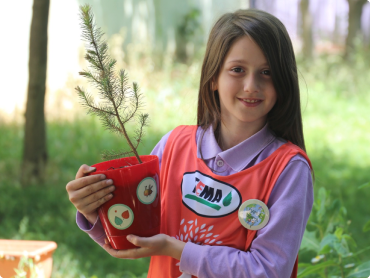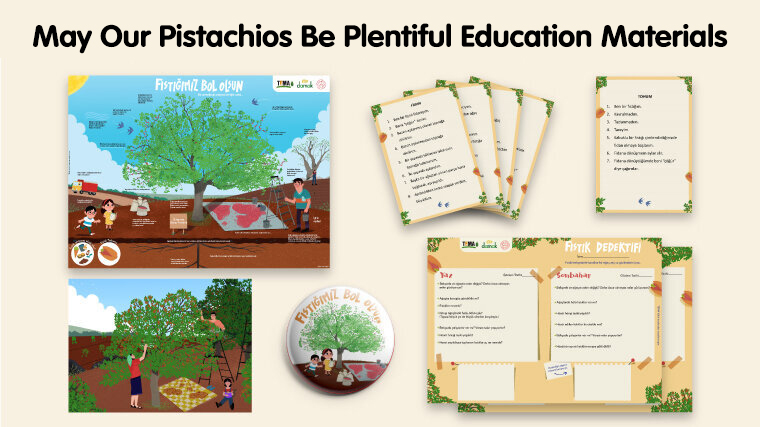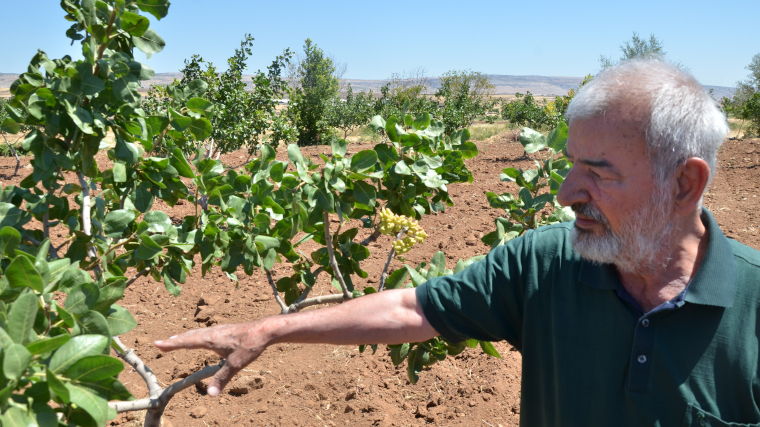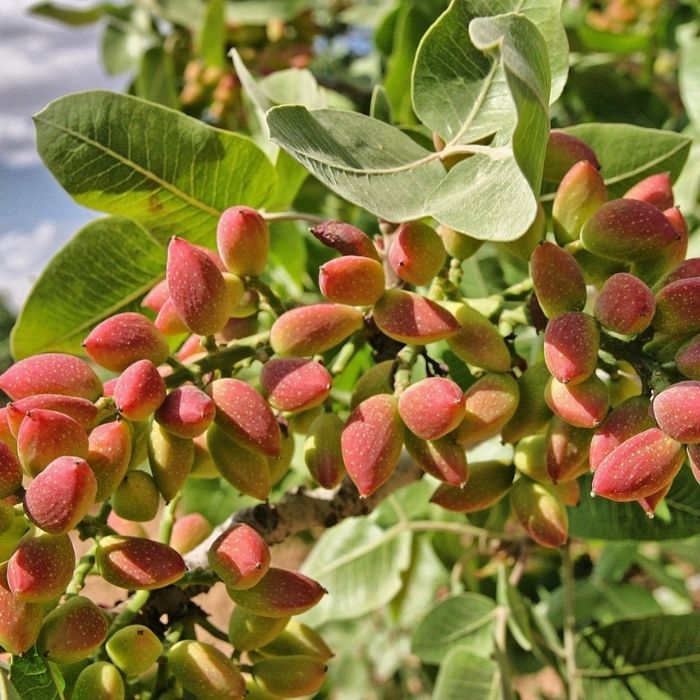Increasing Yield and Quality in Pistachio Production Project in May Our Pistachios Be Plentiful Project
About the Project
The project started in 2011 with the contributions of DAMAK brand and in cooperation with the Directorate of Pistachio Research Institute. The first phase of the project was completed in 2011-2013 and the second phase in 2014-2018. In 2019, the third phase of the project, which is planned to last for 5 years, was initiated and in the same year, an education project was added to the project in cooperation with Gaziantep Provincial Directorate of National Education, aiming to raise awareness of children on pistachio agriculture.
Scope/Goals
Rural Development Project: In the project, it is aimed to raise awareness about the problems related to the productivity and sustainable management of pistachio orchards, to develop permanent solutions to these problems and to gradually improve pistachio production by disseminating the model created in the Barak Plain.
Education Project: The aim of the educational activities is to see the place of pistachio in our lives, to realise its importance for Gaziantep, Turkey and the world, to inform children about the value of the local product produced by their parents, to encourage them to protect this product and to continue production.
Activities
Rural Development Project: In the third stage of the project for 2019-2023, consultancy and yield analysis studies will continue, good agriculture trainings will be given to 100 producers in Gökçeli Basin, and project practices will be disseminated in the region, producer talks will be held in 6 villages in the neighbourhood every year and 90 producers will be reached annually, at the end of 5 years, a total of 60 vaccinators and 60 pruners will be trained, 5 gardens will be applied in 50 trees within the scope of sample applications of crown rejuvenation in old pistachio trees, awareness-oriented training will be provided on peanut agriculture to 4,500 children studying in 3rd and 4th grades of primary schools.
Education Project: In this context, a short-term activity supported by educational materials such as posters, presentations and worksheets prepared for primary school children is implemented by TEMA Foundation volunteers in the classrooms of volunteer teachers.
What Have We Done So Far?
In the project, 648 producers in Gaziantep Yavuzeli and Araban districts and Şanlıurfa Birecik districts were trained in 2011-2013, and 23 sample application gardens, one of which is organic, with a size of 611 decares were established where the project sample applications were carried out and regularly monitored and consulted by experts. At the end of 3 years, the yield in the sample gardens increased by 149% compared to the neighbouring gardens. In 2014-2018, project implementations were organised to be implemented in the Barak Plain, where production is the highest in the region and yield per tree is the lowest. Gaziantep Oğuzeli, Nizip and Karkamış districts are also included in the project. With the 154 producers selected in this region, the number of gardens counselled increased to 177 and the garden size to 6,201 decares. 824 producers were trained in 5 years. In order to overcome the shortage of expert vaccinators and pruners in the region, 56 certified vaccinators and 77 pruners were brought to the region. In order to overcome the lack of male trees in the gardens, 2,000 male pistachio saplings were grown and distributed to 54 producers who lacked male saplings. Yield analyses were carried out in 21 gardens in the first phase and 33 gardens selected to represent 154 gardens. As of the end of 2018, the yields in these gardens were 113% in the first phase gardens and 3% in the second phase gardens.
In 2019-2020, 886 producers were provided with counselling services. Producer talks with 100 producers and good agricultural practice trainings with 90 producers were organised. In 2020, 50 trees in 5 orchards were subjected to crown rejuvenation in the second year, and 1,000 grafted male pistachio seedlings were distributed to 183 producers in 36 villages in order to eliminate the lack of male trees in the orchards. With all the project practices carried out, an average yield increase of 105% in the first phase gardens, 54% in the second phase gardens and 80% in the second phase gardens was achieved in 2020 compared to the neighbouring gardens in the project gardens.
In 2021, when we started the 10th year of the project, garden visits and counselling support to producers on pistachio cultivation continued. A total of 322 producers received counselling services during the year. 5 good agricultural practice trainings with the participation of 83 producers, 10 producer talks with the participation of 170 producers and certified pruner training with the participation of 20 producers. In addition to the 1000 grafted male saplings distributed in 2020 in order to increase pollen density, 500 grafted male saplings were distributed to 139 producers in 38 villages during the year. We continued to distribute the book "Pistachio Cultivation with Questions and Answers", "Pistachio Agriculture Pocket Calendar" and "Pistachio Wall Calendar" from the project materials to the producers and distributed 447 materials in total. According to the results of the 2021 yield analyses conducted within the scope of the project, 125% yield increase was achieved in FBO-1 gardens, 84% yield increase in FBO-2 gardens, and an average yield increase of 105% was achieved when the project gardens were evaluated collectively.
Within the scope of the project, educational activities were developed and educational materials were designed for primary school level. The aim of the studies is to see the place of pistachio in our lives, to realise the importance of pistachio for Gaziantep, Turkey and the world, to draw attention to the conditions for growing healthy and productive pistachio trees, and to make the labour of workers and farmers in this field visible.
5,381 children have been reached at primary school level with the educational activities implemented in Gaziantep since 2019.
In 2022, consultancy services of 393 man/day were provided. A total of 558 producers were reached through 17 “good agricultural practice” trainings and 22 meetings with producers. With the certified pruner training, 21 new pruners were trained to serve to the region. Leonardite-based soil regulator organic fertilizer practice was applied in 22 producer orchards, a total area of 100 decares in size. We continued to distribute project materials to producers, including the book "Pistachio Cultivation with Questions and Answers", "Pistachio Agriculture Pocket Calendar", "Pistachio Wall Calendar" and "Brochure on the Importance of Male and Female Trees in Pistachio", and a total of 2,178 materials were distributed. According to the 2022 yield analysis conducted within the scope of the project, a 136% yield increase was achieved in FBO-1 orchards and a 129% yield increase in FBO-2 orchards, and when the project orchards were evaluated collectively, an average 133% yield increase was achieved.
376 consultancy services were provided in 2023. Within the scope of the training activities, 154 growers were reached with 9 conversation gatherings with growers, 134 growers were reached with 9 good agricultural practice trainings, and 45 technical personnel were reached with 2 local engineer trainings. Through the program on train certified pruners and graft experts, 25 new graft experts and 21 new pruners were trained in the region. Two garden day events with the themes of "Emergence and Control of the Branch Moth Pest in Pistachio" and "Effect of Different Fertilizing Methods on Soil Plant Nutrients and Water Retention" were held with the participation of 85 growers. We continued to distribute project materials to growers, including the book "Pistachio Cultivation with Questions and Answers", "Pistachio Agriculture Pocket Calendar", "Pistachio Wall Calendar" and "Brochure on the Importance of Male and Female Trees in Pistachio", and a total of 927 materials were distributed. According to the 2022 yield analysis carried out within the scope of the project, the average yield in all orchards included in the project at the end of the 13th year was increased by 2.5 times, with a 158% yield increase in FBO-1 orchards and 148% in FBO-2 orchards.



